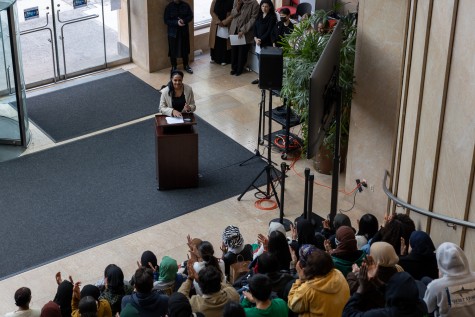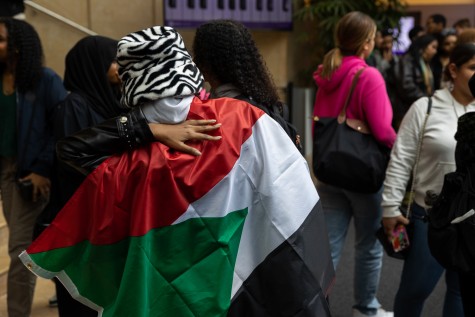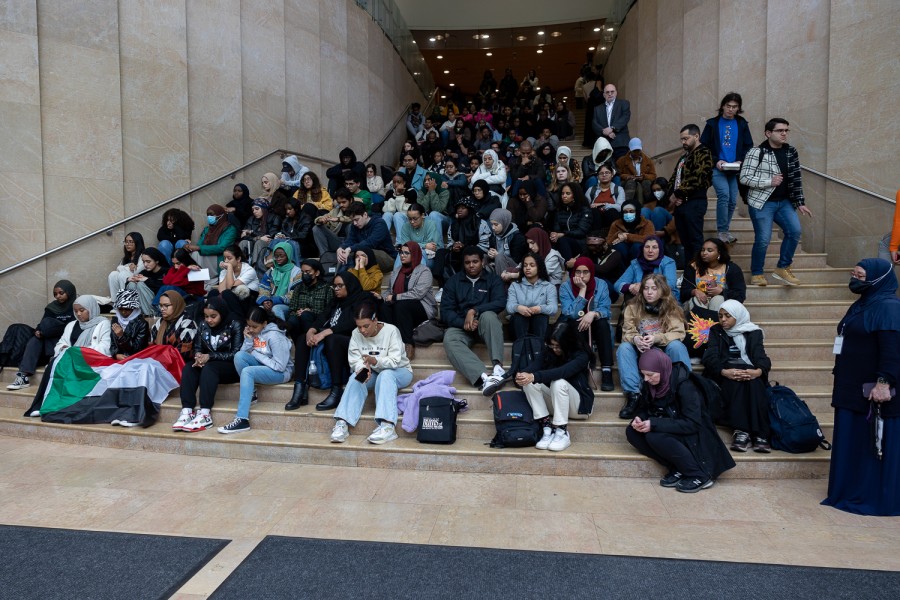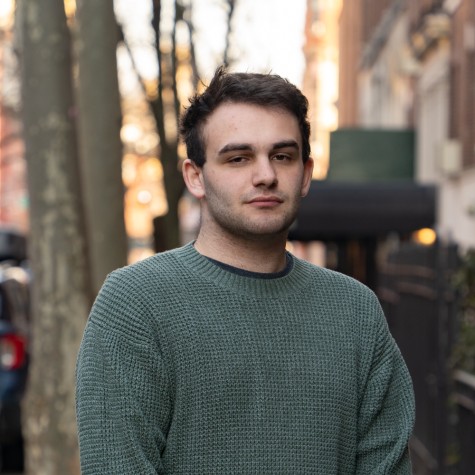NYU students and faculty hold vigil to mourn deaths in Sudan
Over 100 students and faculty members gathered at NYU’s Kimmel Center on Thursday, April 27, to grieve the hundreds of lives lost in the ongoing conflict in Sudan.
Dozens of students gathered for a vigil to raise awareness for the ongoing conflict in Sudan at the Kimmel Center for University Life on April 27. (Jason Alpert-Wisnia for WSN)
April 28, 2023
More than 100 NYU students and faculty gathered in NYU’s Kimmel Center for University Life on Thursday to mourn the hundreds of lives lost in the recent violent power struggle between military leaders in Sudan.
The vigil, which took place on the Kimmel steps, where most university vigils are held, was organized by the Black Muslim Initiative at NYU alongside the university’s student affairs and diversity and inclusion offices. Monia Yousif, a second-year graduate student who helped organize the vigil, spoke of the importance of raising awareness of the conflict in Sudan.
“If your country is facing injustice, it’s very easy to feel alone,” Yousif said. “Knowing that you have a community and you’re not alone in these spaces is extremely important.”

The conflict in Sudan broke out on April 15, when the country’s military and the Rapid Support Forces, a paramilitary group, exchanged fire over control of the country. Since 2021, the Rapid Support Forces — which are also known as Janjaweed, a name associated with widespread atrocities — has been calling for more power in the Sudanese government. The RSF was originally founded by Omar al-Bashir, Sudan’s ousted dictatorial ruler, and was for a time integrated with the country’s military — which it is now fighting.
Over 500 people have been killed in the crossfire, according to Sudan’s health ministry, though the true death toll is likely much higher. The conflict has left thousands without food, water and electricity. Tensions resulted in the displacement of many Sudanese citizens, with some having escaped conflict by going to nearby countries including Chad and Egypt.
Midnight local time on Monday, the two forces agreed to a three-day ceasefire, which was extended by another three days on Thursday, allowing citizens more time to exit the country. Fighting in the country’s capital has reportedly continued despite the ceasefire.
Rund Mohammed, an NYU junior who attended the vigil, has been working with other Sudanese students to raise awareness of the situation in Sudan through social media. She said that activists on campus are hoping to create a student-led organization for Sudanese students at NYU next year. Mohammed has family in the country who are trying to flee to Egypt.
“What people are not recognizing is that something like this has quite literally never happened before,” Mohammed said. “Everyone’s families are affected, and it’s taking a toll on our studies — it has taken a toll on our lives here. It’s very hard to watch the situation from a screen, and you’re miles away from home, but you can basically do nothing.”
In 2019, Sudan’s military carried out a coup to overthrow the dictatorial president, and he was charged with war crimes, crimes against humanity and genocide. The new military government agreed to a 39-month plan to transition Sudan to a democracy. Last year, the country’s prime minister, Abdalla Hamdok, resigned due to backlash over a deal he made to share power with the military. The military had staged another coup a few months prior, and the deal, combined with Hamdok’s resignation, put the military back in power.
Khalid Latif, the university’s chaplain and the director of its Islamic Center, spoke at the vigil and encouraged students to remain hopeful.

“Hope isn’t meant to be something that’s fleeting,” Latif said. “Now, I would say to NYU students in particular, you have to really think about why you are where you are, and what it is that you want to use your skills, your credentials and your training for.”
Yousra Ibrahim, a sophomore at NYU who also helped organize the vigil, spoke about the different ways the NYU community can provide support, emphasizing the importance of donating to humanitarian relief organizations, spreading awareness and participating in demonstrations.
“Don’t let Sudan be something that dies out on the internet as a trend,” Ibrahim said.
Contact Alina Hollister at [email protected].

























































































































































